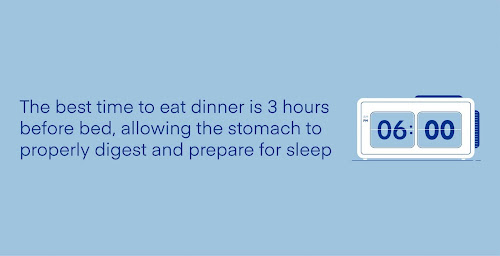The Elixir of Life, better sleep tips and why early dinner is important
In our fast-paced modern society, sleep often takes a backseat to the demands of our busy lives. Many people view it as a luxury, sacrificing hours of precious rest for work, social activities, or screen time. However, the truth is that sleep is not just a routine activity; it is the elixir of life, vital for our overall well-being and essential for our physical, mental, and emotional health.
Getting a good night's sleep is essential for your overall well-being. Here are some practice tips to help you improve your sleep quality:
Tip #1: Better sleep quality: When you eat closer to bedtime, your body is still actively digesting, which can affect the quality of your sleep. By allowing a sufficient gap between dinner and sleep, you provide your body with an opportunity to rest and recover, promoting better overall sleep quality.
Balanced fluid distribution: An early dinner can help balance the distribution of fluids in your body. When you consume a large meal late in the evening, it can cause fluid shifts in your body, potentially leading to increased urine production during the night. By having an early dinner, you give your body more time to regulate fluid balance before you sleep, minimizing the need and the likelihood of nighttime urination; i.e. much less wake up during the nighttime.
We do have many more practice tips, please drop us a message on twitter or LinkedIn.
#loveyourself, #sweetsleep
Also, here are some more facts to explore the importance of sleep, its benefits, and provide some compelling examples to highlight its significance.
1. Restoration and Physical Health:
Sleep plays a crucial role in the restoration and rejuvenation of our bodies. During sleep, our immune system strengthens, allowing it to combat diseases and infections more effectively. Additionally, sleep is essential for cellular repair, muscle growth, and tissue regeneration. Lack of sufficient sleep has been linked to an increased risk of chronic conditions such as obesity, diabetes, cardiovascular diseases, and weakened cognitive function.
Example: Athletes and professional sportspeople recognize the importance of sleep for peak performance. They prioritize quality sleep to optimize their physical health and enhance their recovery after intense training sessions or competitions.
2. Cognitive Function and Mental Well-being:
Adequate sleep is closely tied to our cognitive abilities and mental well-being. While we sleep, our brains consolidate and process information, facilitating learning, memory retention, and problem-solving skills. Sufficient sleep is also crucial for maintaining emotional stability, regulating mood, and reducing the risk of mental health disorders such as anxiety and depression.
Example: A study conducted at Harvard Medical School found that medical residents who worked extended shifts without adequate sleep were more prone to making medical errors, compromising patient safety. This example emphasizes the critical connection between sleep and cognitive function.
3. Creativity and Productivity:
Quality sleep fuels our creativity and enhances our productivity. When we are well-rested, our minds are sharper, more focused, and better equipped to generate new ideas. Sleep deprivation, on the other hand, impairs our cognitive flexibility and hampers our ability to think creatively. It also leads to decreased productivity, as fatigue and lack of concentration hinder our performance.
Example: Visionary figures such as Thomas Edison and Salvador Dalí were known for their unique sleep habits that fostered creativity. Edison would take short naps throughout the day, while Dalí practiced "slumber with a key," a technique to tap into his subconscious mind and gain inspiration for his surrealistic artworks.
4. Emotional Resilience and Social Interactions:
A good night's sleep contributes to emotional resilience and healthy social interactions. When we are well-rested, we are better equipped to regulate our emotions and react calmly to stressful situations. Conversely, sleep deprivation increases the likelihood of irritability, mood swings, and difficulty in managing emotions. Sound sleep also improves our social interactions by enhancing empathy, communication skills, and fostering better relationships with others.
Example: A study published in the Journal of Sleep Research found that couples who reported poor sleep quality were more likely to engage in negative conflict resolution strategies and experience relationship dissatisfaction. This example highlights the impact of sleep on emotional well-being and interpersonal dynamics.
Conclusion:
Sleep is often undervalued in our modern society, but it is a fundamental pillar of our overall health and well-being. From physical restoration to cognitive function, emotional resilience, and creativity, sleep impacts every aspect of our lives. Prioritizing quality sleep and adopting healthy sleep habits can bring remarkable improvements to our daily lives, allowing us to unlock our full potential and truly experience the elixir of life.
Remember, a good night's sleep is not a luxury but a necessity for a fulfilling and vibrant existence.
